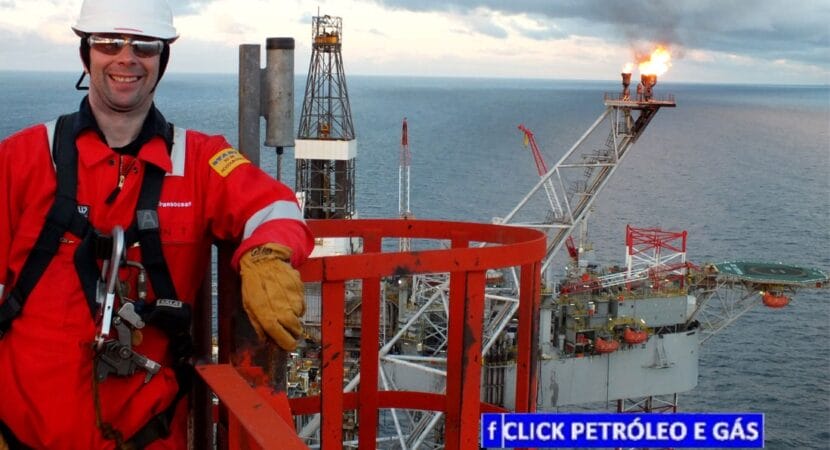
Definitive guide on how to work onboard in the oil business and succeed
O work on board ou offshore it is one of the branches most desired by most Brazilians, especially the population that lives in the states that cross the coast of the country. The reason for this desire is the above-standard wages compared to work on land, in addition to different work schedules. But to be able to work in this sector is not easy at all. It takes a lot of study, qualification and knowledge of which area you want to pursue. In the next paragraphs, you will know categorically and well explained how to proceed to enter this industry.
But what is embedded work?
Ship work is a term used for industrial or commercial activities at sea, but as the subject of this guide is related to the oil and gas sector, we will just restrict ourselves to the phaco theme.
In 1953, Petrobras was created and along with it, the need to obtain new technologies and professions for hydrocarbon exploration activities in shallow, deep and super deep waters.
Which professionals work in this sector?
Professionals of engineering, technical and professional training in the industryl, are the most requested. This is because the offshore oil industry is a very restricted and specific market segment. Some professions that we practice on land can also be developed on board. Here are some examples:
- electricians
- Mechanics
- Electronics
- Engineers
- Hospitality
- Others
Other professions, in addition to those mentioned above, exist only in the oil and gas sector, such as:
- driller
- Oil and Gas Technician or Engineer
- deck pushers
- tool pusher
- Driller
- platformers
What education and qualifications should I have?
You should look for institutions regulated by the MEC to become professional, as companies, mainly under Petrobras requirements, only hire trained and qualified people to carry out activities in both offshore and onshore units. Examples of institutions are the federal schools of Senai and CEFET.
You also need to have a license to practice the profession. This same is issued by CREA (Regional Council of Engineering and Agriculture). Except only if the professional obtains only the professional course.
There are also training courses according to the type of work environment in which you will develop your activities in an offshore environment. They are called NR's (Regulatory Standards). The most common ones required by oil and gas companies are:
- NR-10: Safety in Electrical Installations
- N-33: Activities in confined spaces
- NR-35: Work at height
Eventually, there will be companies that will ask for other NR's, but with the exception of those mentioned above, the others are very rare in terms of requirements.
O CBSP and HUET these are mandatory safety courses for anyone who wants to work offshore, it's no use because without them there is no possibility of you going on an offshore unit. The purpose of the CBSP is to provide training in case of need to abandon the platform due to security issues, incident or accident of any nature. The HUET, on the other hand, is another training whose purpose is to give you conditions to leave an aircraft, which are mostly helicopters, in case it falls into the water for any reason.
O Irata and the Abendi are also on the rise today. Due to the need to carry out maintenance work in places that are difficult to access or very high, these courses qualify professionals to work hanging from ropes. These qualifications are a great asset and can increase your salary due to the dangerous nature of the job. The difference between Irata and Abendi is that the first is international, that is, you can work in any foreign company in Brazil and abroad. Abendi only serves the Brazilian market, despite the purpose of the 2 being the same.
O English it is no longer a differential and can be decisive in selection processes. This is because most companies providing services are multinational, and the exchange between Brazilians and foreigners is through the English language. The most detailed article on the English is no longer a differential, but rather a must, you can read with more details here.
How do I apply for jobs in this sector?
Working with oil in the offshore industry is really not easy, but it is perfectly possible. Although restricted and there are many variables, I will list some methods below that will facilitate your entry into this world:
- During the period in which you are studying technician or higher, do internships related to your area of expertise. This will add value to your resume and knowledge of the field.
- Large offshore companies have their own websites with recruitment channels and updates on open positions. You can check some of them by clicking here.
- Nowadays, many oil companies open selection processes through HR sites, such as LinkedIn e Jobs. It is very important that you have a profile on these 2 portals, they are currently the most used by companies to screen CVs.
- Another method that generates a lot of controversy is having the famous “FISH”, which is a term used for someone who has an acquaintance who works in any offshore company. You can ask this acquaintance to intercede for you or even mediate your entry into companies. The controversy of this method is that it can remove the vacancy of a really qualified professional in favor of another with no knowledge of the area.
- The other method is to keep an eye on the site Click Oil and Gas. The portal always has an eye on the selection processes in progress, providing and updating professionals in the naval, industrial and offshore sectors.
Would you adapt to this life?
Fly – Contrary to what many think, life on board is not that easy. First you must overcome the fear of flying, the first experience in a helicopter can be a little tense the first few times.
Confinement – Usually the work schedule for those who work in this segment is 15 days on board with 12-hour shifts and 15 days off. There are people who cannot adapt to being confined on an iron island, where there is only the infinite horizon of the sea and far from the family. For those who work on vessels in the naval sector, these periods can be up to 28 days at sea or more.
Long article, no? But oddly enough, this is the shortest way possible. I hope that this article can help you to get your long-awaited job on board. It's nothing that deep, but it's already a "north" for those who still have doubts. Do you have any other tips you want to share with us? Leave it in the comments fields below and tag me in the subject by typing “@clickpetroleoegas” which I will be happy to answer everyone.









You can stop the ship from descending, this Brazil…
Ronaldo shines a lot in Corinthians
Ronaldo shines a lot in Corinthians
These advances are important, but for…
Show when it arrives here I'll buy one…
I am interested
...I do not know!!! The Corolla 2024 has an engine…
And in the state of Bahia?